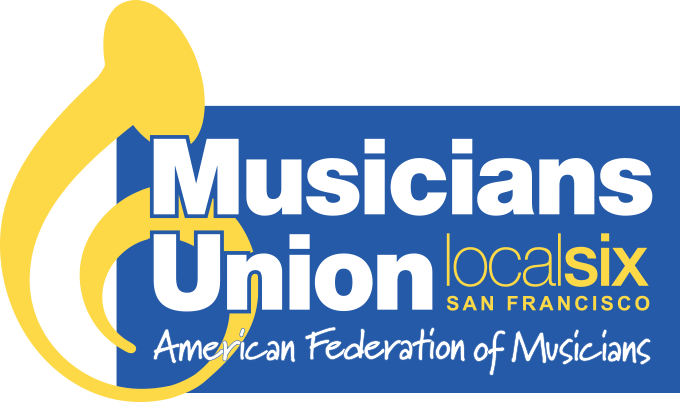DR. MARGIE BAKER: VOCALIST “The Power Of The Mic”
by Alex Walsh
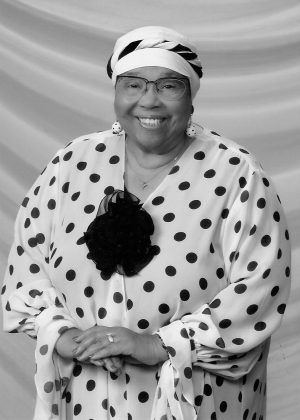
Margie Baker was tired. After a full day of working at the school district office, she had just come out of another contentious meeting at the San Francisco Board of Education. To calm herself down, she decided to take herself to dinner and take in some jazz. Some musician friends of hers were playing at the Hilton, so that’s where she went. “These friends knew I could carry a tune, and they used the power of the mic on me. I heard George Hanapen, the guitarist, say, ‘Ladies and Gentlemen, we have this wonderful lady in the audience who sings beautifully’—And I was just eating my dinner—‘her name is Miss Margie Baker.’”
“I was so angry with George. I’d never sung anywhere in my life, publicly, except singing from a hymnal book in the church! So I went up there, I didn’t want to embarrass him. He used the power of the mic on me. That wasn’t right—I didn’t want to do that! Anyway, I went up and I sang I Left My Heart In San Francisco. Well, I went back to my meal, and all of these gorgeous men approached my table. It was three of them that I remember.”
Those three gorgeous men informed Margie that the CEO, Mr. Conrad Hilton, and his son Baron, who were sitting across the room, loved her singing and would like to hire her.
“I said, ‘Beg your pardon?’ I said, ‘Sirs—I am a Christian, a wife, a mother, and a schoolteacher. I am not a singer. You’ve got the wrong person.’”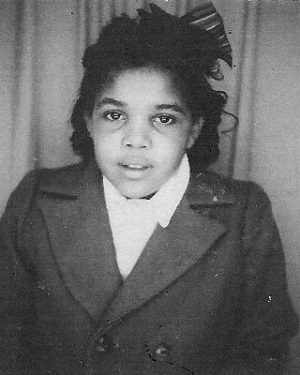
Nine years old.
After dinner, the hotel manager, Mr. Lewin, told Margie that they loved her, and although she was a schoolteacher, they would make it very easy for her. “I said, ‘Sir, you’ve got the wrong person.’”
“‘Well, I’ll tell you what,’ he said. ‘You go home and ask your husband. Talk it over with him. Think about it, and in a few days call me and tell me what your decision is going to be.’”
“So that’s what I did. I went home to my husband and I said, ‘Kenneth, you’re gonna laugh your heart out. Do you know I’ve been offered a job at the San Francisco Hilton?’ And he did laugh. ‘You?’ I don’t think Kenneth had ever heard me sing! He said, ‘Well, you know, you’re an educator, and you’re a school administrator, and if you want to burn your candles at both ends and be a fool, then go right ahead.’”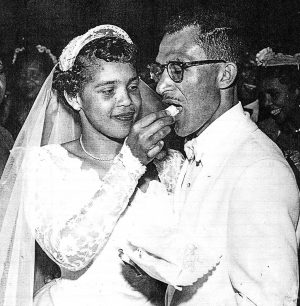
Margie and Kenneth’s wedding, 1955.
A few days later, Margie called Mr. Lewin and told him that her husband had said it would be okay, and she felt it would be okay to try it out. “He said, ‘Okay, let’s start with two nights a week, Sunday and Monday, because I know you teach and you’re in administration—and I know we’re going to love you. And in the summertime, you work five nights a week, Tuesday through Saturday.’ I said, ‘Well, let me just start with Sunday and Monday. Let’s not think about the summer, because I don’t know whether you’re going to like me. And, I don’t know—I’m not into show business.’”
EARLY YEARS
Margie Baker was born in the Piney Wood country of East Texas, right on the Louisiana/Texas border, in 1933. “You’ve heard the song Johnny B Goode? I was born in a shack in the woods, back in the 30s, in the deep South. No running water, no electricity. I was born of dirt-poor African American black folks. My folks were extremely spiritual, strong believers in God, and they instilled that into me. My grandpas, both of them, were ministers. One was Methodist and one was Baptist.”
Margie’s mother did not want her to grow up in that atmosphere. In the 1940s, she came out to San Francisco and got a job as a riveter during WWII. “My mom made good money in those days, during the war. You know, the women were doing all the hard jobs. So she saved her money and opened a cleaning shop on Fillmore Street. The second one was on Divisadero Street. One of her best customers was a young musician who played in all of the jazz clubs in the Fillmore. His name was Earl Watkins. I’ve known him since I was knee high to a duck. He became a very important union man and we stayed friends until he died. Two of my musical heroes, also union men, were Eddie and Vernon Alley.”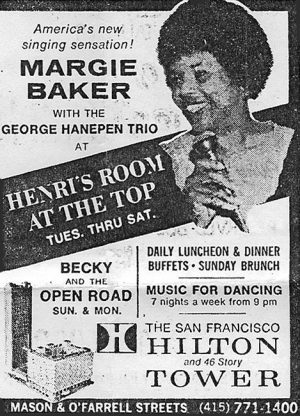
“Bill Cosby and other great stars of the Las Vegas Hilton, Colonel Parker along with
Elvis Presley, all said it was a “must” to come to San Francisco and sing along with
Margie Baker.” — Mr. Lewin, SF Hilton Manager
“I was never interested in performing music, but I grew up in the Fillmore district, where there were night clubs up and down Fillmore Street, and soda fountains. And in those soda fountains—I couldn’t go to the nightclubs—there was all kinds of music, especially African American music, because in those days, African Americans could not play east of Van Ness Avenue. They had to play west of Van Ness Avenue. So that was where a lot of what we call ‘race music’ was. So I grew up on that race music.”
Margie says that no one in her family had any formal musical training, but they were all very musical. “They were all church folks. Black folks that go to church are musical. We’re all just naturally musical. My musical training was in the church, and that wasn’t training, it was just natural. You know, Dinah Washington used to play piano in the church, Sarah Vaughn used to play piano in the church. African American jazz singers didn’t have the privilege of taking lessons. We learned our lessons through church music. I was always interested in music, and I loved to dance, but I was not interested in performing music. I never thought I could do that.”
Margie attended Girls High School in the Fillmore. She became student body president and graduated when she was 15. “I used to be in the newspaper because I was the only black student leader, and a girl at that, so they always put stuff in the paper.”
After high school, Margie attended the University of California at Berkeley on a scholarship, transferring after two years to San Francisco State University, where she got her bachelor’s degree in history, and a teaching credential. “I met a very famous jazz musician when I was 17. I was a sophomore in college, and he was very impressed by that. All of us college kids used to go to a jazz club called the Blackhawk, on Turk and Hyde, almost in the middle of the Tenderloin. That’s where we would hang out on Sunday afternoons, ‘cause we got a chance to sit behind a screen and hear all of the famous musicians. We were too young to sit out in the bar. I met a musician named Dizzy Gillespie, and he was my mentor until the day he died.”
After college, Margie married the love of her life, Kenneth Baker, and they eventually had two daughters. In 1955, Margie began her career as a teacher at Patrick Henry Elementary School on Potrero Hill.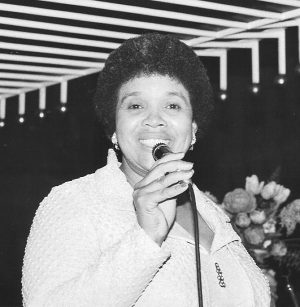
Margie sang at the Hilton from 1972 – 1990.
In 1959, she went on an adventure to Australia with her sister-in-law. “She sang with Count Basie. I spent a summer traveling all over the world with her, because she was young, 17, and I was asked to chaperone her. Her name was Mary Stallings.”
A few years later, Margie began working on her masters degree and administrative credential. She was eventually assigned to the San Francisco Unified School District’s central office, where she worked for 25 years. In 1983, she received her Ph.D. in Education from the University of San Francisco. Fed up with San Francisco school politics, Margie eventually resigned from the administration and went to Marina Middle School, where she retired as Dean of Students in 2002.
A STAR IS BORN
Margie began working at the Hilton in 1972, and was a hit right away. She sang Sunday and Monday during the school year, and in the summer, five nights a week, Tuesday thru Saturday. If there were any big balls in Las Vegas, the management would fly her from the SF Hilton to the Las Vegas Hilton to perform. “I would be flown there on Friday, I’d perform on Saturday, and I’d come back home on Sunday. I didn’t think of it as glamorous. I just thought, ‘What am I doing?’”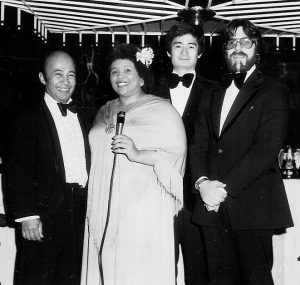
Margie Baker with the George Hanepen Trio in the 1970s. From left: George Hanepen, Margie Baker, Shota Osabe, & Michael Currato.
When word got out that Margie Baker was now a singer, Dizzy Gillespie pushed her to quit the school district and travel on the road with him. “I said, ‘Mr. Gillespie, I’m not going to do that! First of all, when you travel out on the road, you’re making $10,000 a concert. You’re only going to pay me $300 or $500. I make more than that as a school administrator. And my husband is a postal administrator. I’m not going to leave my family and go on the road.’”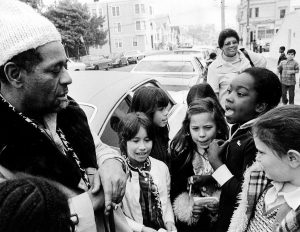
Dizzy Gillespie visiting Margie’s class: “Mr. Gillespie loved children.
I had a hard time getting him to stop talking.”
“That’s what the music world meant to me; it didn’t mean anything. God gave me a gift that I didn’t know that I had, and I’ve given that gift everywhere. But I’ve never pursued being a star or anything like that. That’s just totally distasteful to me to pursue that. That’s not where my ego is. But Lord, the music business has been so good to me, in every way.”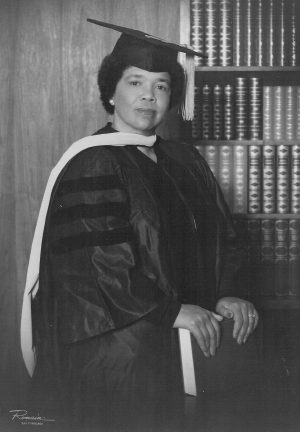
Dr. Margie Baker, 1983.
Over the years, Margie made a name for herself as a premiere West Coast jazz vocalist. She was featured in jazz music magazines and won “Best Entertainer” in 1989 at the San Francisco Gold Awards. Jimmy Lyons, founder of the Monterey Jazz Festival, was determined that she perform at the Festival every year. She eventually toured the world with the Festival, from 1988 to 1996. “The Monterey Jazz Festival was a traveling festival. Our main festival was in September, but we also traveled all over the world, New Zealand, Australia, Japan, and then I traveled to Russia.”
In the late 1990s, Margie settled back into local gigs, playing hotels and what was left of the small clubs in the Bay Area, such as Shanghai 1930 and Club Jazz Nouveau. In 2004, she released her first CD, “Margie Baker & Friends, Live at Rasselas” on the Consolidated Artist Productions label, a small label owned by Michael Longo, Dizzy Gillespie’s pianist. So far they have released three CDs, and Margie has been spotted recently in the Local 6 rehearsal hall working on a new one. “My publicist at the label said it’s about time that I go into the studio and make a purist jazz album.” She also has a longstanding invitation to perform at the Dizzy Gillespie Theater in New York.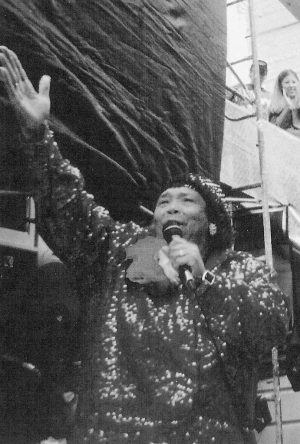
Performing at the Fillmore Jazz Festival, 2005.
Margie continues to perform regularly at the Hyatt Regency in Burlingame, as well as for other special events around the Bay Area. As a long time union member, she encourages younger musicians to join. “To me, the business part of the performing arts is just not pure and honest all the time, and I don’t like that. That’s why I don’t want any part of it. I have had really wonderful experiences because I have not allowed myself to get out there and be disrespected. I’ll walk off from a job in a minute—you don’t disrespect me. ‘Cause I respect you, I want you to respect me, despite all of our challenges. We can deal with our challenges with respect. And that’s why I’m a union person and I believe in the union.”
Margie thinks that musicians are selfish and short-sighted for not joining the union. “The thing that you hear is: ‘Well, what is the union doing for me?’ As if the union is in the employment business. The union can’t give them jobs! But when those musicians get in trouble, they might need the union to negotiate, to have their backs on things. I was in the Teachers union. I was in the Administrators union. I believe in unions.”
